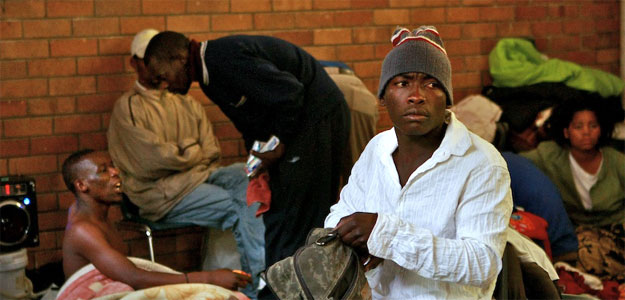
How To Clean Up For The Cup

South Africa experienced a busy close to 2008. As the country was swept up in preparations for their hosting duties of the 2010 World Cup, the government of long-time ANC stalwart Thabo Mbeki collapsed, ushering to power the controversial Jacob Zuma, whose 2006 acquittal on rape charges has done little to dampen his political rise. As Toussaint Losier explains in a recent piece for Scoop, the election victories of Zuma and the defeat of Mbeki may be, in large part, due to the boycott of the 2006 and 2007 elections by a group that was previously unheard and unseen by the political elite- the poor communities that cluster in shantytowns and squats in city and country alike.
To understand why these groups- who in the apartheid past were often at the forefront of protest for government equality- are now protesting by disengaging from government altogether, Losier points to shack fires, evictions, and bulldozing as culprits. A statement from the group Abahlali baseMjondolo (Shack Dwellers in Zulu) reprinted by Losier blames a lack of electricity and "taps or fire hydrants to fight fires" as a main cause of the debilitating blazes that regularly destroy shacks, before calling on the government "to upgrade settlements with proper brick houses."
Thus far, the protection of these communities seems like an unlikely step for a government seemingly determined to weed out shantytowns and squatters in a bid to attract tourism dollars, investment, and spectators for the World Cup. But it is not an unfamiliar story, one that the world most recently witnessed as Beijing demolished its warren of historic streets to make way for Olympic stadiums. What makes the South African case particularly complicated is the public health and environmental concerns that accompany these poor communities.
From the government perspective, shantytowns and urban squats are liabilities whose presence in delapidated buildings and environmentally vulnerable areas- clustered near riverbanks or on rural plains- constitutes a public health crisis and a drain on resources. In a controversial 2001 eviction of a shantytown perched on the edge of the Jukskei River documented by the Afrol news agency, environmentalists hailed the bulldozing of the shack city as a "long overdue move for the river's reprieve."
At the same time, communities who have deep connections to their residences claim that it is the very negligence of the government that has placed them in their situation. As Abahlali baseMjondolo's decree indicates, many shantytown dwellers and squatters hope for government intervention to help establish formal settlements with functioning sanitation, water, and electricity. A 2001 report from IRIN quoted Johannesburg squatter Nelson Khethani, who explained the steps the residents of his building had taken to establish a functioning home. "We are not criminals," he said. "We have a building committee that controls who moves in and out, and we clean the building from top to bottom every Sunday ourselves."
While some cities have taken steps toward institutionalizing squats- Johannesburg transformed the abandoned Europa Hotel into a community housing center- squatters and shantytown residents remain a shadow problem that is sometimes easier swept away than solved.
-Equatorial Press Staff Report. Photo Courtesy of Tebogo Letsie/IRIN.


